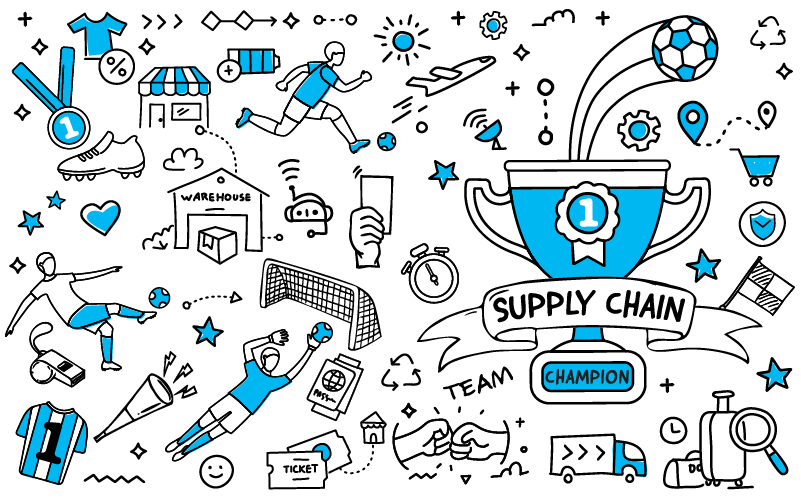This blog post was written by Wayne Snyder, Vice President, Industry Strategy – Retail EMEA, and Gael Ramaen, Corporate Vice President – EMEA. Both are avid football (also called soccer in other parts of the world) fans and will be cheering on their respective teams at the 2024 European Championships.
Beginning tomorrow, June 14, 2024, more than 2.7 million football fans will converge on stadiums across Germany for the European Championships, held every four years. Many more viewers will watch on TVs, iPads and mobile phones as 24 teams battle it out for European football supremacy.
As avid football fans – one from England and one from France – the tournament made us think about the parallels between football and the retail supply chain. The world of retail moves as quickly as Mbappé and requires the skill of Bellingham. Both football and retail are ruthless environments, characterized by strong competitors who are always looking to knock you out. Every day demands peak performance. Both are unpredictable, ever-changing and volatile, with no easy victories. Results are affected by many factors, including weather conditions, team selection and strategy, and other unpredictable events.
In both football and retail, there’s an ever-increasing use of data to help prepare for the unexpected. Knowing what to do next – whether that means who will take penalties or how to navigate a blocked shipping lane – allows a faster, better response to challenging situations. Visibility, enabled by real-time data, positions key players to analyze any obstacles and respond both quickly and strategically. Both football and retail planning can often feel chaotic, but winners are always working with a detailed strategy. Whether to play 4-3-3 or 5-3-2, or whether to have a nearshore or offshore retail supply chain network – both are deliberate decisions based on optimizing performance and dealing with risk. Both require the strongest planning, linked to flawless execution.
That brings us to another key parallel: Both elite football and the retail supply chains require unfailing teamwork and orchestration. Harry Kane cannot score without the passing of Saka, and Camavinga is as important to stopping a goal as Maignan. Similarly, retail supply chains can’t fulfill their potential unless all functions are aligned with the same objective. The products bought by a retailer must align tightly with distribution planning, fulfillment planning and order management. Planning, operations, logistics, store, and digital functions cannot focus solely on their own narrow KPIs but must understand how they connect with one another. As we noted in a previous blog, retail supply chains simply can’t succeed unless all the players are aligned around the same goals.
Just as retail success doesn’t only happen at the store shelf, football is not just about the 11 players on the pitch. Success will be driven by the whole squad, including the manager, coaching staff, and medical staff — as well as by bus drivers, cooks, kitmen who take care of the equipment, and other invisible contributors. It’s very much like the modern retail supply chain, with its sprawl of suppliers, logistics providers, and hundreds or thousands of unsung heroes in the form of warehouse, transportation and store employees. At Blue Yonder, we believe supply chain colleagues are true superheroes, every bit as important as star football players.
Just like the team that scores the decisive goal in the final at the end of the tournament and wins the trophy, successful retail supply chain teams thrive on teamwork, solid preparation, and an ability to read the pitch and pivot quickly. They’re strong in every position. And they’re supported by the right resources. The best players don’t just perform well on match day, they give everything every day. They train as if everything is on the line. The same needs to be true in the retail supply chain. Every little detail is important. Marginal gains are critical. Like elite football teams, retail supply chains are always gearing up for their moment in the spotlight.
We will see many of our customers putting these principles into practice. Whether this is our customers who are official sponsors of the event or those that are having to predict the almost unpredictable consumer impact, the next month will be critical. How much beer should be stocked, how many football shirts should be printed, what flags should be ordered. Retailers are facing a month where every match result can have a major impact on their profit, and we wish them all well in their endeavors.
This leaves us with one final question: Who do we predict will win? At Blue Yonder, we’re well-known for our market-leading artificial intelligence (AI) models — so we both analyzed thousands of data points, fed in a multitude of factors and ran many scenarios. Our data scientists have even developed a special algorithm that runs probabilities at the beginning of every major football tournament. After detailed analysis, Wayne believes England will win, and Gael hopes that France will be crowned champions, just as they did in 2000. In football, sometimes there’s room for your passion to over-rule even the best analysis.
We hope you enjoy watching the football matches and see the parallels with your everyday job as a supply chain superhero. Now is the time for your retail supply chain team to be crowned champions!

